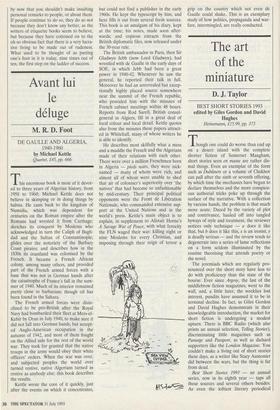Avant lui le deluge
M. R. D. Foot
DE GAULLE AND ALGERIA, 1940-1960 by Michael Kettle Quartet, £45, pp. 666 This enormous book is most of it devot- ed to three years of Algerian history, from 1958 to 1960; Michael Kettle does not believe in skimping or in doing things by halves. He casts back to the kingdom of Numidia, which was dependent for centuries on the Roman empire after the Romans had wrested it from Carthage; sketches its conquest by Moslems who acknowledged in turn the Caliph of Bagh- dad and the Sultan of Constantinople; glides over the notoriety of the Barbary Coast pirates; and describes how in the 1830s its coastland was colonised by the French. It became a French African colony, among many others, and provided part of the French armed forces with a base that was not in German hands after the catastrophe of France's fall in the sum- mer of 1940. Much of its interior remained pretty close to barbarism; though oil has been found in the Sahara.
The French armed forces were disin- clined to be pro-British after the Royal Navy had bombarded their fleet at Mers-el- Kebir by Oran in July 1940, to make sure it did not fall into German hands, but accept- ed Anglo-American occupation in the autumn of 1942, and most of them fought on the Allied side for the rest of the world war. They took for granted that the native troops in the army would obey their white officers' orders. When the war was over, and subjected peoples the world over turned restive, native Algerians turned as restive as anybody else: this book describes the results.
Kettle wrote the core of it quickly, just after the events on which it concentrates, but could not find a publisher in the early 1960s. He kept the typescript by him, and here fills it out from several fresh sources. This book is an amalgam of his diary, kept at the time; his notes, made soon after- wards; and copious extracts from the British diplomatic files, now released under the 30-year rule.
The British ambassador in Paris, then Sir Gladwyn Jebb (now Lord Gladwyn), had wrestled with de Gaulle in the early days of SOE, in which Jebb had been a great power in 1940-42. Whenever he saw the general, he reported their talk in full. Moreover he had an unrevealed but excep- tionally highly placed source somewhere near the summit of the French republic, who provided him with the minutes of French cabinet meetings within 48 hours. Reports from Rod Sarell, British consul- general in Algiers, fill in a great deal of local colour and local detail. Kettle quotes also from the minutes these papers attract- ed in Whitehall, many of whose writers he is able to identify.
He describes most skilfully what a mess and a muddle the French and the Algerians made of their relations with each other. There were over a million Frenchmen born in Algeria — pieds noirs, they were nick- named — many of whom were rich, and almost all of whom were unable to shed that air of coloniser's superiority over 'the natives' that had become so unfashionable by mid-century. Their principal political opponents were the Front de Liberation Nationale, who commanded extensive sup- port at the United Nations and in the world's press. Kettle's main object is to explain, in supplement to Alistair Horne's A Savage War of Peace, with what ferocity the FLN waged their war: killing eight or nine Moslems for every Christian, and imposing through their reign of terror a
grip on the country which not even de Gaulle could shake. This is an exemplary study of how politics, propaganda and war- fare, intermingled, are really conducted.


















































 Previous page
Previous page